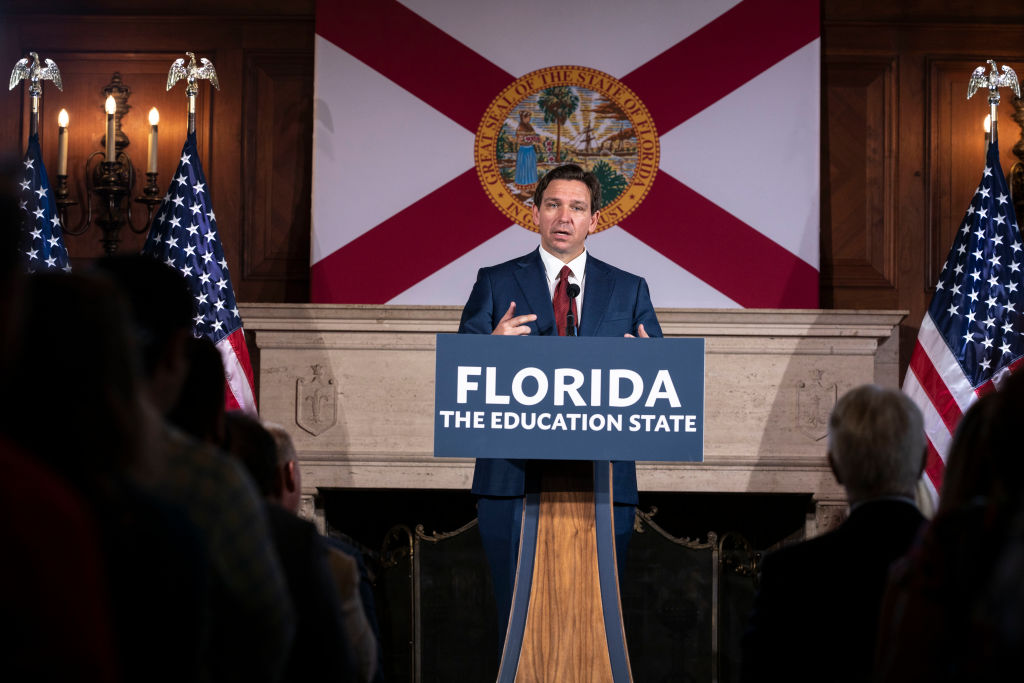The prophet of antiracism preaches a perverse (and predictable) gospel.
Florida Leads the Way

The Sunshine State’s education reforms are a model for the nation.
Reforming education involves the notoriously difficult task of reforming bureaucracies. Legislatures and governors can pass laws that demand change, but education bureaucracies are notorious for simply absorbing reforms without changing their ways. This is why former Secretary of Education William Bennett called them “the blob.” Florida has not only taken action to force the blob to change, but it has also reoriented the blob with new standards. Though blobs are gonna blob, Gov. DeSantis’s determined administration, combined with other reforms, has resulted in the best chance to reform a state education system in two generations.
Florida has used its political and financial control to implement a plan to reconstitute its K-12 system, as we show in a new report from Claremont’s Center for the American Way of Life and the Idaho Freedom Foundation. Florida’s blueprint, which eliminates old standards while imposing new ones, provides a model for the rest of the country.
Florida’s two new parental bills of rights (one passed in 2022, the other in 2023) require local school districts to provide parents access to curriculum, assessments, and instructional materials. Parents can opt out of nonacademic surveys. The bills prohibit instructional practices based on assumptions of race essentialism or scapegoating and ban the use of radical gender theories and transgender ideology in K-8 classrooms. While many states have aspirational parental bills of rights, Florida puts teeth in theirs. Parents can sue districts for declaratory judgments and injunctive relief against violations, and can receive reasonable attorney fees; or the Florida Board of Education can appoint a special master, at school district expense, to investigate alleged violations. The Florida Department of Education (FDE) can also withhold funds to pay school board members or administrators (according to Florida regulations).
The FDE directed school districts to desist from applying transgender student policies and gender support plans that hide student name changes, pronoun use, or desire to transition from parents. The FDE also investigated school district racial equity policies and directed the districts to update their policies to comply with state law, which prohibits schools from promoting race essentialism or scapegoating.
Public school librarians are required to receive training on “material harmful to minors,” a legal definition which includes obscenity and pornography. School boards must adopt procedures for the removal and discontinuation of books based on their alignment to state standards. The FDE publishes a list of materials that have been removed or discontinued by school boards as the result of an objection and disseminates the list to school districts for their consideration. Failure to adhere to the policy results in administrative fines.
Florida’s most celebrated accomplishment is the creation of Education Savings Accounts (ESA) for all K-12 students. As a result, more students every year can leave public schools for private options or homeschooling. These accounts permit families to withdraw from district schools and receive an ESA of around $8,700, which can be used to pay qualified education-related expenses, such as tuition or tutoring. In 2023, when the program was robust but not yet universal, nearly 13 percent of Florida students were in private schools, five percent were homeschooled, and 13 percent were in charter schools. These numbers are going to rise as the numbers of students using ESAs has increased from under 250,000 last year to more than 400,000 this coming year. More students are draining from the public system.
The greatest virtue of the DeSantis education blueprint is that it does not settle for the old conservative playbook of school choice. He has organized a respectable, conservative group of scholars to reorient the entire K-12 education system through the promulgation of new state standards in English Language Arts, Mathematics, Social Studies, Civic Literacy, and Health Education. The English standards cover a vast number of titles and literary periods, including sections on the Greeks, the Renaissance, and the Romantics, in addition to American literature. Standards are content-based, which has been demonstrated to improve literacy by grounding reading in a matrix of meaning. The standards are so good, its critics have been reduced to making the spurious charge of racism.
Florida has leveraged its new standards to get revisions from textbook and curriculum manufacturers. It also plans to leverage state standards to change teacher preparation programs. At the same time, Florida no longer requires an education-specific degree to teach in public schools. Teachers can now get temporary certification for up to five years. Forty-two percent of Florida teachers have alternative certification, far more than in most other states. The new standards, combined with openness to alternative certification, mean that Ed schools will either have to adapt or wither on the vine.
The job is hardly finished in Florida. Efforts to expunge wokeness from its system are under threat, including from litigation on school libraries, unions, and gender transitioning. Persistent practices remain in the system. K-12 Diversity, Equity, and Inclusion offices, of which there are at least 30 in the state’s 67 school districts, could be disbanded. “Restorative Justice” programs should be shut down and replaced with traditional discipline standards. Social-Emotional Learning and abstinence-in-name-only sex education programs should be abandoned. Squeezing poor practices out will require continued vigilant oversight from the state Department of Education and from likeminded parents. More wins at the school board level are necessary.
Florida’s new state standards will take time to reorient the system. Also, they cannot take root in hostile soil. Both battles—curricular and administrative—must be fought at the same time, so this will be a long slog. Gov. DeSantis and Florida have provided the blueprint for other states to reconstitute their education systems—and have shown determination in the fight.
The American Mind presents a range of perspectives. Views are writers’ own and do not necessarily represent those of The Claremont Institute.
The American Mind is a publication of the Claremont Institute, a non-profit 501(c)(3) organization, dedicated to restoring the principles of the American Founding to their rightful, preeminent authority in our national life. Interested in supporting our work? Gifts to the Claremont Institute are tax-deductible.
Woke commissars cannot be allowed to terrorize employees.
Recovering manly endeavor in an age of docility.
Why East-Central Europe has proven resistant to woke doctrine.
Woke communism is turning our country into a totalitarian police state.
The best of the year in “show, don’t tell”






